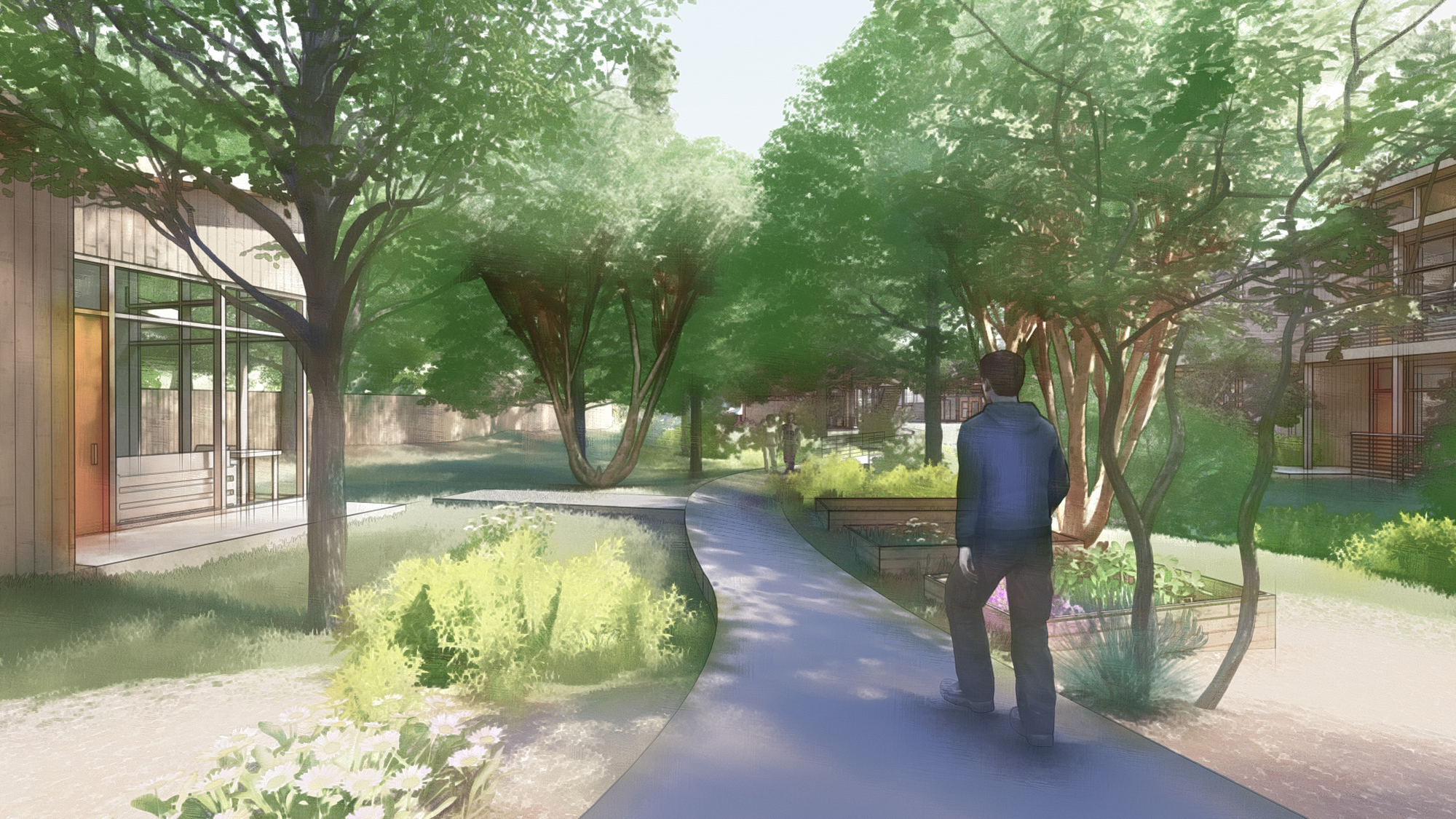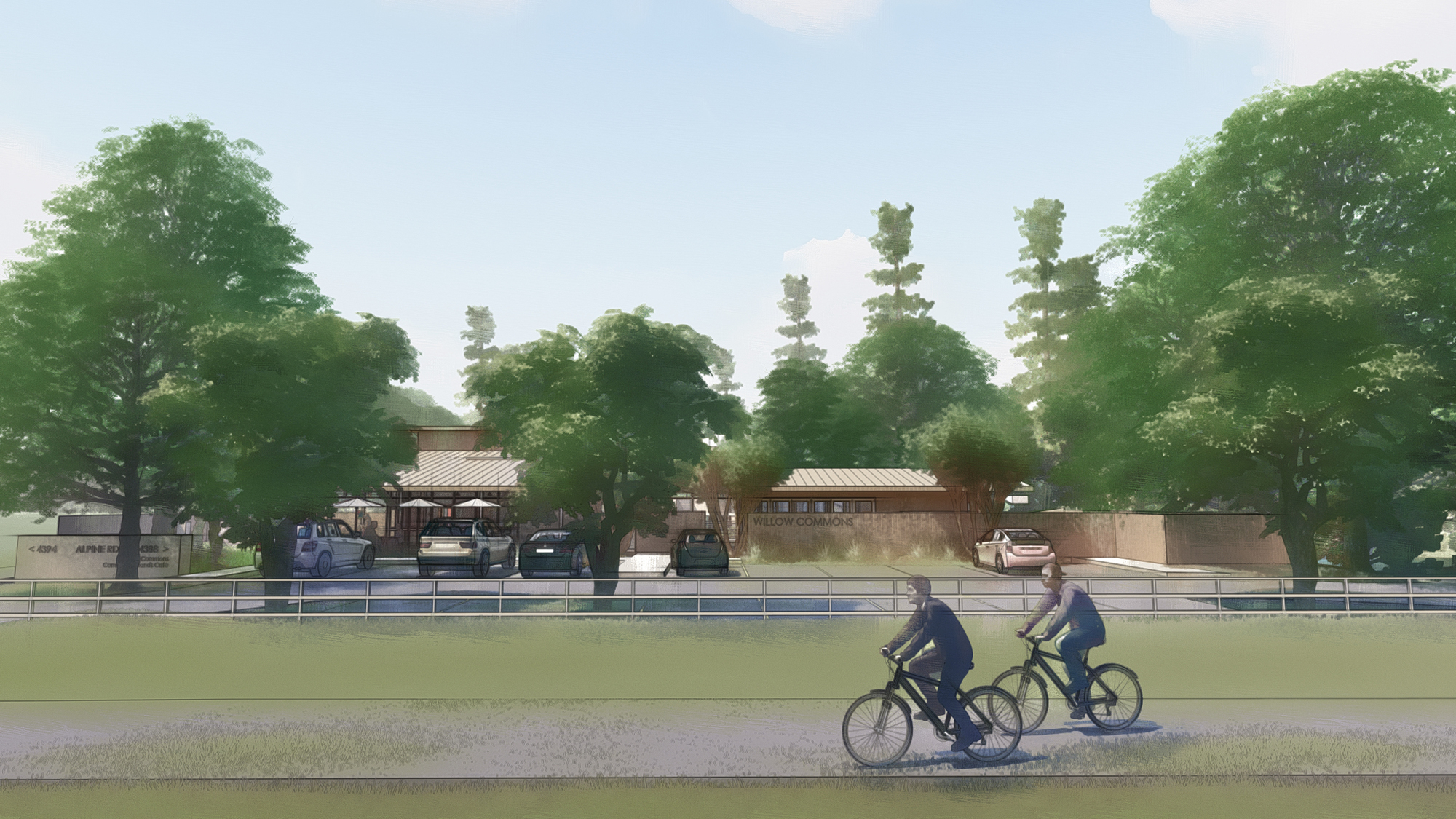Several years back, longtime Portola Valley residents Jim and Patty White started to research where their daughter, Amy, who has Down syndrome, could live independently once she became an adult. They were struck by the lack of options.
With this in mind, the couple plans to bring a proposal to build 13 apartments for adults with disabilities at 4388 Alpine Road to the town's Architectural & Site Control Commission on Dec. 13.
The proposed project, estimated to cost between $8 million and $10 million, would be located in a commercial corridor known as the Nathhorst Triangle. It's an area former Planning Commissioner Betsy Crowder said two decades ago would be an ideal location for affordable housing.
The housing project, called the Willow Commons, would only be available for adults with intellectual or developmental disabilities (I/DD), defined as differences that are usually present at birth and that uniquely affect the trajectory of the individual's physical, intellectual, and/or emotional development, according to the National Institutes of Health. It would also be designated for low-income individuals, rented to eligible residents for roughly $600 per month, according to the Whites.
"Our inspiration here is Amy; she opened the door for us to understand the challenges that families have," said Jim White, who's lived in town for 20 years. The Whites submitted an application to the town for the proposal early last month. "People are struggling to find permanent supportive housing," he said.
Up until June, Amy was in an East Coast boarding school for people with developmental delays. She is now renting a house in Portola Valley to continue to exercise independent skills, he said.
Finding affordable housing for the I/DD population is a "chronic problem," according to the Whites. San Mateo County has lost 11% of its licensed care facilities, while demand has grown 20% to 30% over the last six years (to a little over 300,000 people in the I/DD category), according to a presentation last week by Housing Choices, a group that helps people with developmental and other disabilities secure housing.
This housing could also count toward the town's significant increase in the number of units it must plan for in its 2023-31 Regional Housing Needs Allocation (RHNA). This cycle, the town is tasked with designating 253 units of housing.
The project provides the town with some of the first deed-restricted, low or very low-income housing units, according to a Willow Commons project fact sheet.
Differences from Stanford Wedge project
Another Alpine Road project, often referred to as the "Stanford Wedge," has been a lightning rod for public debate on building and the risks it poses to fire safety and traffic. Stanford University's proposed 39 housing units, called Portola Terrace, would be located on part of 75 acres of university property that's currently undeveloped or used for horse boarding.
The Willow Commons project is very different, said Jim White. The site is adjacent to a commercial corridor on a "very accessible flat lot" within the moderate zone in the 2008 Moritz Fuel Hazard Map and has a "relatively lower risk to seismic activity," according to the proposal. The intended residents, who for the most part would not have driver's licenses, would have multiple opportunities for employment within walking distance of their homes, the Whites note in their proposal. Woodside Priory School, The Sequoias, Roberts Market and the Portola Valley Elementary School District have written letters of support for the project. Residents have the potential to be a "loyal, local labor force," the proposal states.
"The needs for Stanford faculty are so different," Jim White said. "This project (the Willow Commons) is not a fire risk area. ... It will be the same height as the (current) building. It won't be visible from the streets. It will improve it from (an) old, and not well-maintained, building."
The residents
The housing would only be open to people eligible for supportive living services offered by California's network of regional centers.
The Golden Gate Regional Center, which supports San Mateo County residents, reports that over two-thirds of adults with I/DD in the county do not have independent housing. This figure includes 100% of adults with I/DD who live in Portola Valley, a statistic that must be reported annually to the state for RHNA compliance.
The couple would create a nonprofit to run the supported living services and have hired an executive director, Brenda Bachechi, who has worked in special education for decades in San Mateo County.
Project design and timeline
The project is proposed on a 53,473-square-foot site that is zoned administrative/professional and uses the legal provisions of the state's density bonus and supportive housing laws to enable the creation of permanent and affordable supportive housing.
There is currently a small building on the site that formerly housed Linwood Real Estate and Langley Hill Quarry (a septic systems company) before the Whites acquired the land.
They would build 11 one-bedroom, one-bathroom apartment units spread over six buildings. Each would be less than 500 square feet in size. There would also be an attached accessory dwelling unit (ADU) of similar size and design, and a second, detached two-bedroom, two-bathroom ADU of about 870 square feet. The small unit size also serves to accommodate 13 units on the site. They would each come with a washer and dryer.
The average building would be 18 feet tall. Town code dictates a height limit of 28 feet. The buildings would be set back about 75 feet from the street (similar to the existing Linwood building).
The ADUs are intended as homes for staff so the facility can "attract and retain quality support staff in a high cost of living area," according to the fact sheet.
"The specific needs of the intended population have guided the decisions around
the components of the proposed supportive housing community," according to the fact sheet. "The size of the apartment units is intentionally small, to be large enough for residents to have a space that is all their own, but not so large that they would prefer spending all their time there rather than interacting with others in the community. This is important because research has shown many adults with I/DD who do not have adequate social interaction become isolated and may develop depression."
The Whites expect a fast-tracked approval process (between 15 to 18 months) since the 13 units proposed are allowed "by-right" (without a conditional use permit) per the density bonus law. White said they hope to see residents move in as early as late summer or early fall 2023.
Residents would enter the Willow Commons through a common entrance to a building housing a staff office. This common building would include a kitchen, dining and lounge area where residents can prepare and share meals.
The architecture of Willow Commons aims to "preserve and enhance the native ecosystems and habitats of the site and the region," according to the proposal. The residences would be organized behind a main support building that fronts Alpine Road. The roofs would be outfitted with photovoltaic panels. There would also be 17 parking spaces on-site.
For more information on the project, go here.




Comments
Registered user
another community
on Nov 19, 2021 at 11:53 am
Registered user
on Nov 19, 2021 at 11:53 am
Kudos to Jim and Patty White for their vision and dedication to bringing this project to life!
While 26% of folks in the US identify as having a disability, only 6% of the housing inventory is accessible to them. This project will help satisfy a critical need for some of our most vulnerable neighbors and friends.
Registered user
Menlo Park: Downtown
on Nov 19, 2021 at 1:09 pm
Registered user
on Nov 19, 2021 at 1:09 pm
Renderings sure make this project look handsome. As usual I did some math and it appears that total building is 6870sf, so at 8-10M total. The price/sf = $1164-$1455. Seems a tad bit high.
Registered user
Portola Valley: Central Portola Valley
on Dec 9, 2021 at 4:05 pm
Registered user
on Dec 9, 2021 at 4:05 pm
I'm so grateful that Jim and Patty Ann White have taken on this labor of love, not only to pave the way towards independence for their lovely daughter Amy, but for other people in our community with intellectual/developmental disabilities. The care with which this plan has been put together, and attention to details both large and small give me high confidence that Willow Commons will enhance our entire community.
Registered user
Portola Valley: Central Portola Valley
on Dec 12, 2021 at 3:25 pm
Registered user
on Dec 12, 2021 at 3:25 pm
I am so supportive of this project. As noted in the article, supportive housing for adults with developmental disabilities is sorely lacking, and too many people are unable to live independently as a result. This project helps Portola Valley become part of the solution to the problem. Thank you to the Whites for this wonderful investment, not only Amy, but in many other adults who deserve to live and thrive independently and with autonomy.